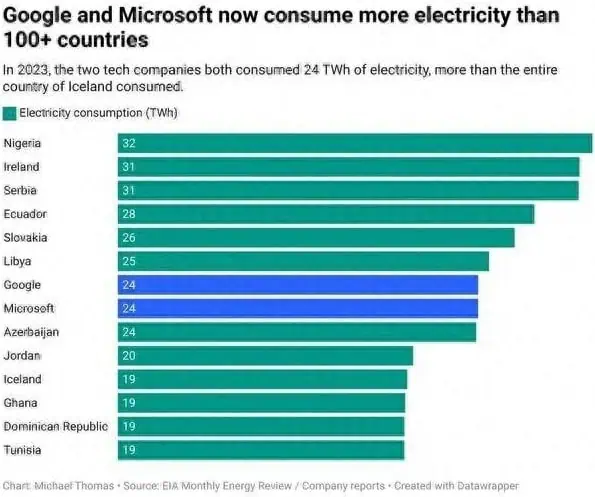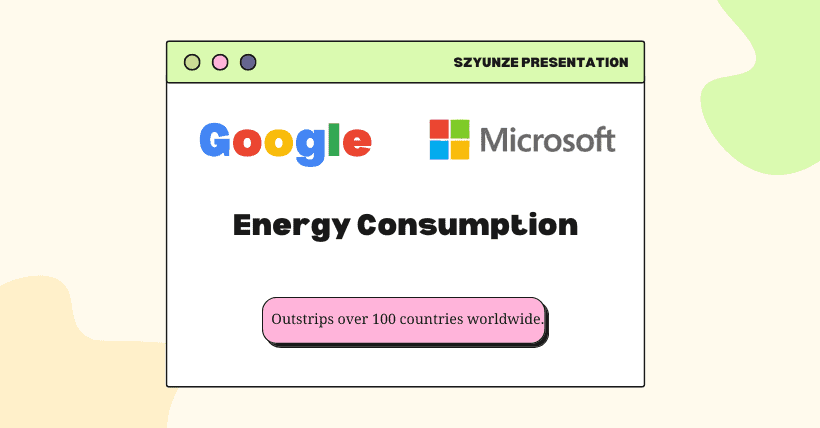Google and Microsoft’s data centers consume a massive amount of electricity. According to analysis by Michael Thomas, in 2023, these two companies consumed 24 terawatt-hours of electricity, exceeding that of over 100 countries including Iceland, Ghana, and Tunisia.
At the same time, both companies are leaders in adopting renewable energy within their industry. Google achieved revenue of up to $305.6 billion in 2023, with its extensive business chain (encompassing search, cloud computing, video platforms, etc.) having an economic impact totaling an astonishing $739 billion.
Microsoft also showed strong performance, reaching $211.9 billion in revenue the same year. Its Windows operating system, office software suite, and Azure cloud services enjoy a large user base globally, with economic effects that are difficult to quantify but potentially reaching trillions of dollars.

In comparison, the GDP of countries consuming a similar amount of electricity as Google and Microsoft is significantly lower. For instance, Azerbaijan’s GDP is $78 billion, Slovakia’s is $127 billion, and Iceland’s is approximately $30 billion.
Despite concerns over the substantial electricity consumption by Google and Microsoft, discussions on sustainable development and renewable energy adoption in the tech industry are ongoing. Both companies are leading the industry towards renewable energy transition.
Google has been at the forefront of using renewable energy, achieving carbon neutrality since 2007 and aiming for all its data centers to run on carbon-free energy 24/7 by 2030. In 2023, Google announced further investments in renewable energy projects, expanding its portfolio to include wind, solar, and other renewable sources.
Microsoft aims to achieve carbon-negative status by 2030, planning to remove more carbon from the atmosphere than it emits. The company has also set goals to achieve zero waste production and efficient water resource use by 2030.
Analyses suggest that AI has further increased the power consumption of tech giants. Data shows that Google’s AI already consumes significant electricity, with each second of use equivalent to powering 7 electric cars. In 2023, Google’s carbon emissions were 50% higher compared to 2019.
Each second, Google conducts 98,379 searches, and if all searches were AI-generated, it would consume 295.14 kWh of electricity, enough to power 7 electric cars.
Reports also indicate that each ChatGPT query consumes 2.9 kWh, which is equivalent to 10 times the electricity used by traditional Google searches.
Experts predict that by 2027, AI’s electricity consumption will account for 0.5% of global electricity usage, equivalent to Argentina’s annual electricity consumption. Analysts from Bank of America predict that due to AI, U.S. electricity demand could increase by 20% by 2030.
Goldman Sachs estimates that by 2030, data center electricity consumption will account for 8% of total U.S. electricity usage, compared to today’s 3%.
Related:

Disclaimer:
- This channel does not make any representations or warranties regarding the availability, accuracy, timeliness, effectiveness, or completeness of any information posted. It hereby disclaims any liability or consequences arising from the use of the information.
- This channel is non-commercial and non-profit. The re-posted content does not signify endorsement of its views or responsibility for its authenticity. It does not intend to constitute any other guidance. This channel is not liable for any inaccuracies or errors in the re-posted or published information, directly or indirectly.
- Some data, materials, text, images, etc., used in this channel are sourced from the internet, and all reposts are duly credited to their sources. If you discover any work that infringes on your intellectual property rights or personal legal interests, please contact us, and we will promptly modify or remove it.



